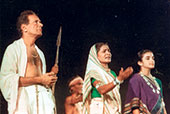 |
| Habib Tanvir in Charandas Chor |
| HE ALSO ACTED IN FILMS |
| Habib Tanvir has left some memorable moments on celluloid. Some of his films: (1953): With this Zia Sarhadi film he made a mark, as an unemployed youth who tries to kill Dilip Kumar’s character (1982): Tanvir played a barrister (1991): The actor was moving as the portrait of loneliness and devastation after his son’s death. (2008): Tanvir played a poet Tanvir also appeared in Sudhir Mishra’s Yeh Woh Manzil Toh Nahin and Ketan Mehta’s Mangal Pandey — The Rising |
Recognition in Bengal came rather late for Habib Tanvir. In 1981, mainstream theatre and culture personalities from the state got the first opportunity to interact with him closely when he came for a festival organised by Gandharba. At Ahindra Mancha, Charandas Chor was performed for the first time in Bengal, where I introduced Habib to an audience of 19. The rest, as they say, is history. Bengal was swept by Habib’s theatre.
Since then, Habib and his troupe participated in numerous theatre festivals, organised by Nandikar and others, staging legendary plays like Agra Bazar, Shatranj Ke Mohrey, Lala Shoharat Rai, Mitti ki Gaadi, Charandas Chor, Ponga Pandit, Jis Lahore Nahi Dekha, Kamdeo ka Apna Basant Ritu ka Sapna and Zahreeli Hawa.
Charandas Chor, especially, became a phenomenon and he performed it at Nandikar’s festivals 12-14 times. I remember Shombhuda (Shombhu Mitra) used to come and watch Charandas Chor every time it was performed. When I asked him why, he said: “Perhaps even Habib doesn’t know what he’s done to Indian theatre with Charandas Chor. One comes across such a gem once in a lifetime if one is fortunate.”
Habib toured Bengal extensively over the last two-and-a-half decades and it brought him a lot of creative fulfilment. I have seen his shows getting sold out within an hour.
His wife, Monikadi, the backbone of his troupe, was Bengali and so we called him “Bangla-r jamai”. He was very comfortable with us. At times, we could not provide quality accommodation and put him up at the dormitory in Moulali’s Yuva Kendra, but he never complained.
Habib won a lot of accolades, he represented India in all major theatre festivals of the world and rightfully so. Recognition from government and non-government sources came his way. But, as is the case with many greats in theatre, he also suffered a lot.
A few years ago, his salary grant from the Centre was stopped because he hadn’t fulfilled some formalities. Unbelievable! He underwent a lot of agony for such things and his troupe and his art suffered.
His troupe was a commune and he needed to live and travel with them for his kind of theatre. They were displaced so many times, from Delhi to Bhopal to other places. The Madhya Pradesh government made him the chief of the state’s Rang Mandal when it was a dying body. He did his best to resurrect it but was suddenly charged with nepotism.
The Bengal government once suggested that he come and stay in the state. When Habib responded positively, our government gave him the cold shoulder. Such things caused him tremendous pain.
Habib was very fortunate, he felt and said, to have Monikadi as his better half. Her failing health, followed by her death, crushed Habib. His daughter’s failed marriage and her inability to wield the reins of the troupe broke him further. All this was reflected in his work in the later years.
Habib, despite his training in acting at the Royal Academy of Dramatic Arts and his command over English language and literature, was never an Anglophile. His doors were open to the West, as he fluently adapted everything from Brecht and Shakespeare to Sophocles. He mixed global classics with Indian folk and developed a unique presentational style.
His sensibility stayed firmly rooted in the soil to which he belonged. Habib revolutionised Indian theatre in his unique style and brought the world into his theatre yet retained everything Indian about it, in a way similar to Rabindranath in his concept of education at Visva-Bharati.
Unlike most other art forms, theatre is here and now. Habib will be remembered as a legend but posterity wouldn’t know what the real essence of his work was. His real evaluation remains to be done by those researching our theatre.
Habib could be our pole star. We must not only shed a few tears and indulge in scattered pieces of commemorative work. Performative research on Habib Tanvir is an urgent need.
Habib Tanvir is dead, but long shall he live in his admirers, enriching theatre in many, many ways.










